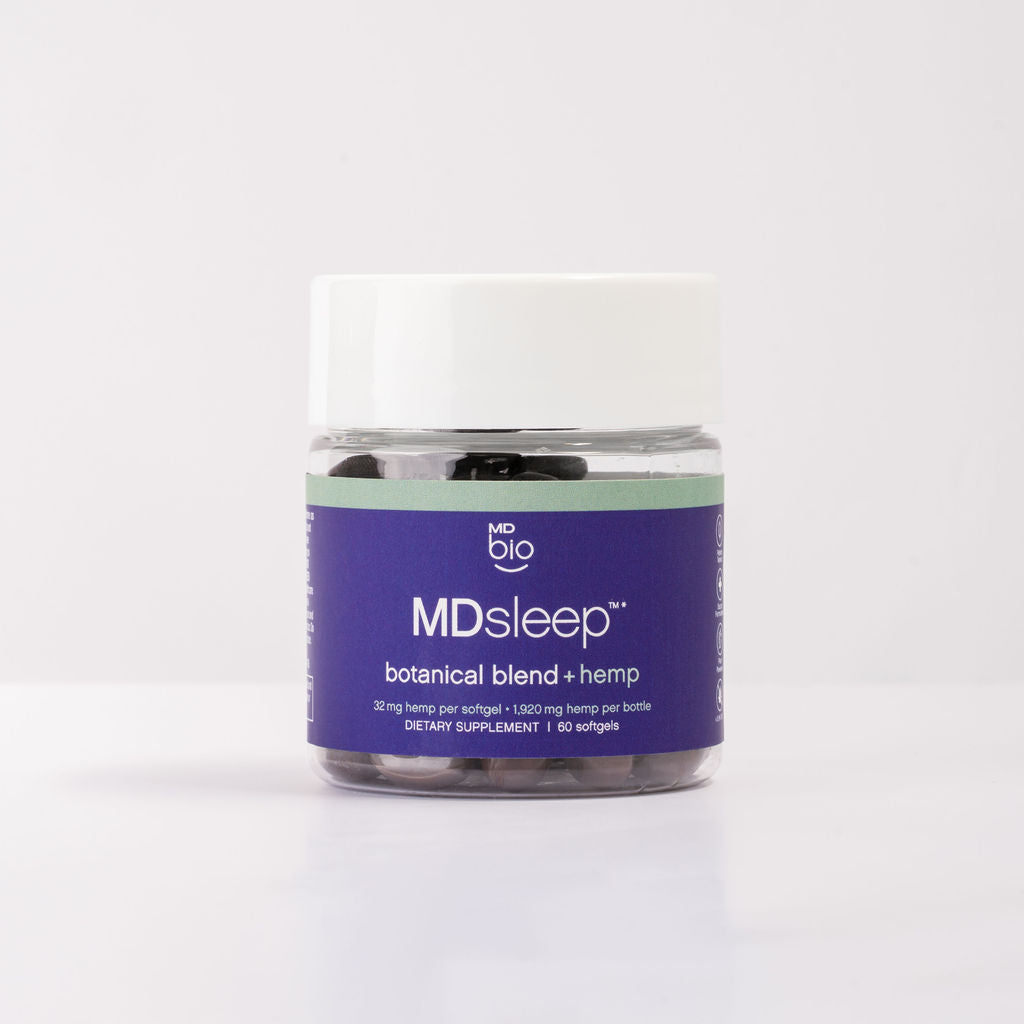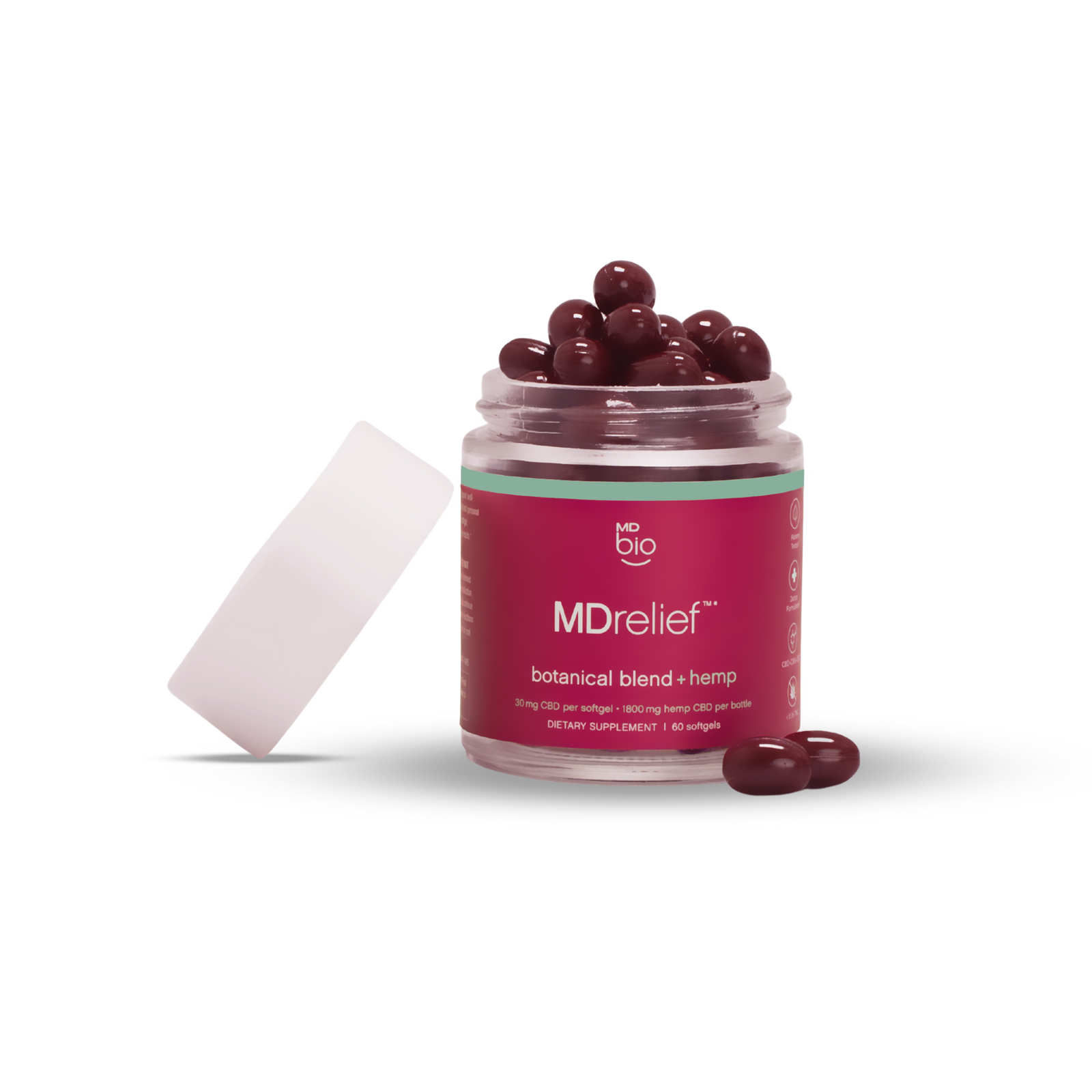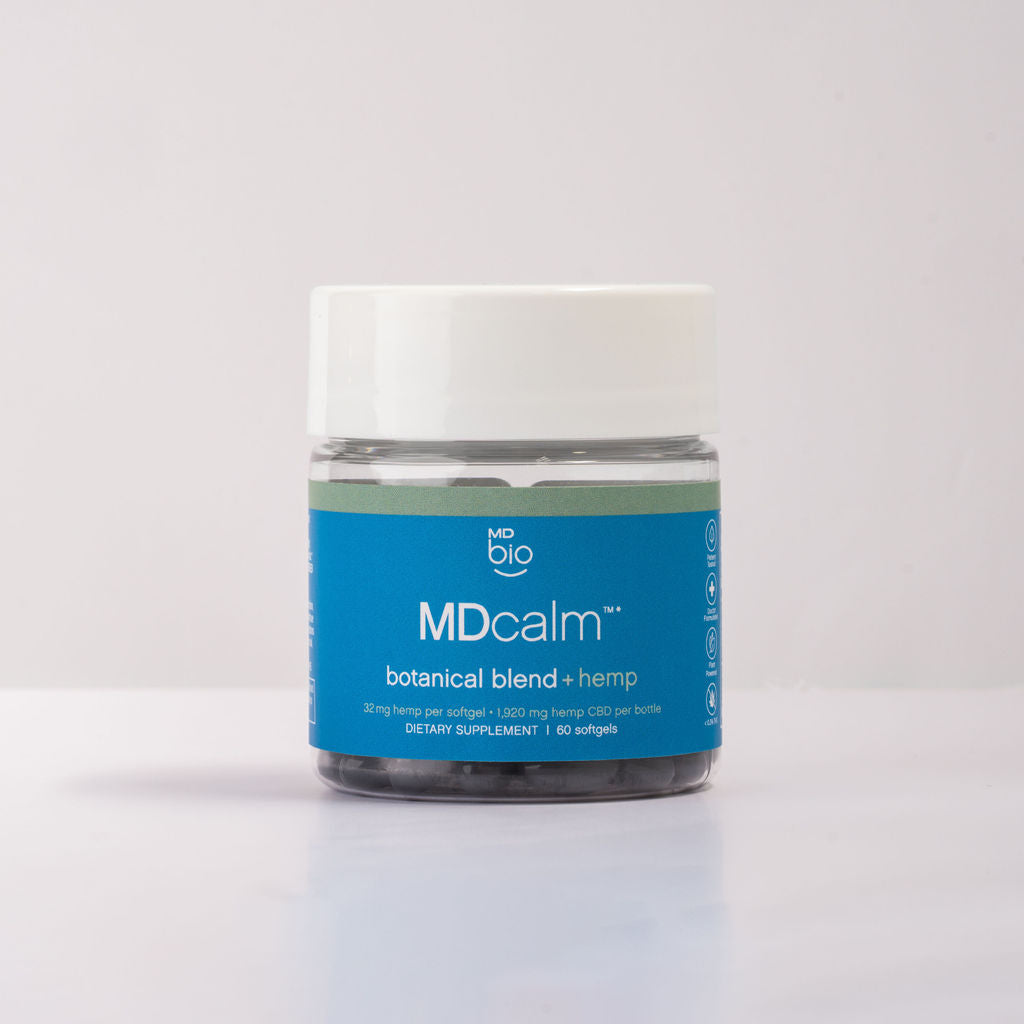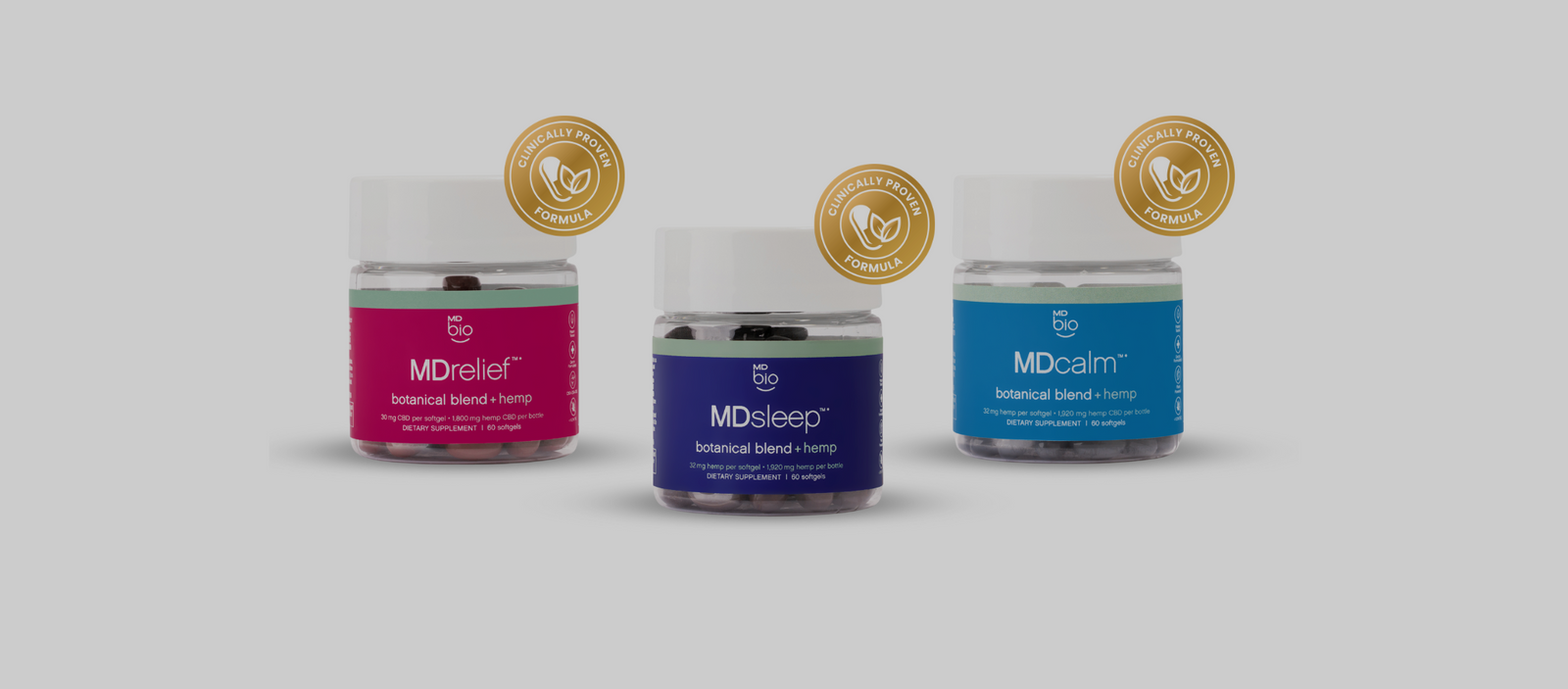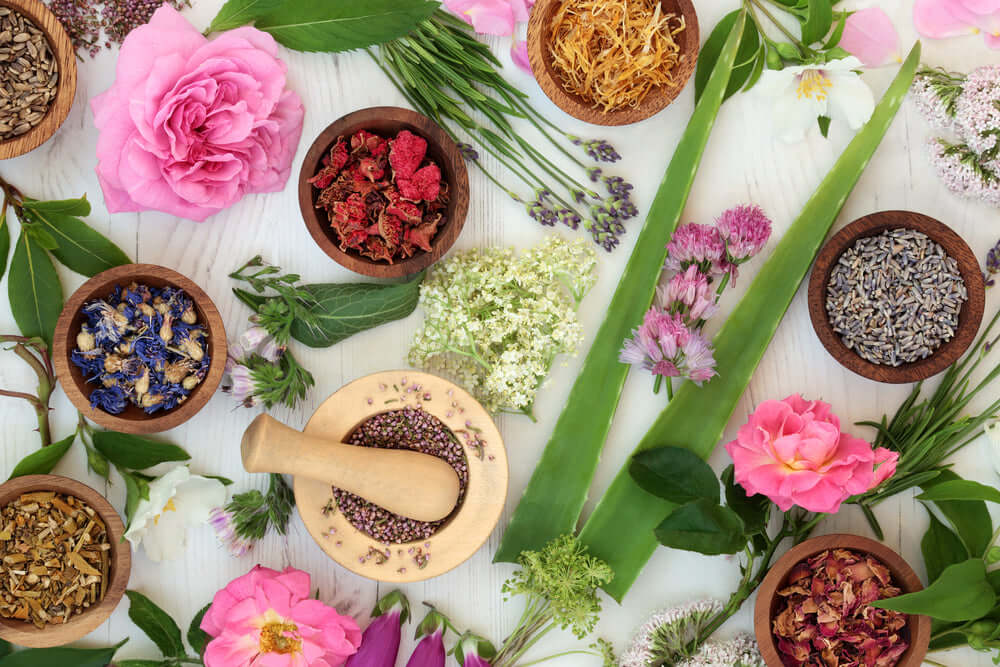
If you've done any research into alternative healing in recent years, you've likely come across the phrase “herbal medicine” during the course of your search. Rising costs of medication and health care, combined with a renewed interest in the healing practices of our ancestors, have drawn more and more people to “non-Western” forms of medicine in the past several years.
But what exactly is herbal medicine as practiced in the modern era? And how do the ingredients most commonly found in herbal remedies come together to support whole body health?
Keep reading for a full run-down of some of the most powerful herbs used in natural medicine, as well as an overview of both the historical and present-day uses of healing herbs.
What is Natural Herbal Medicine?
Herbal medicine, also referred to as phytomedicine, botanical medicine, or plant medicine, involves the use of different plant or fungus parts to treat various conditions inside and outside the body. This often involves using the bark, berries, roots, leaves, flowers, stems, or seeds of multiple different plants to create herbal supplements designed to target a specific type of ailment or promote health in a particular part of the body. Herbal medicine may be ingested in different forms, including:
- Capsules
- Tablets
- Powders
- Teas
- Tinctures
- Extracts
The use of natural remedies and herbal supplements has been well-documented by anthropologists and medical historians. Archaeological studies have uncovered evidence that humans have been developing and using natural herbal medicine for over 60,000 years. Many non-industrial societies that have survived to this day still practice the same healing techniques their ancestors did.
In recent times, herbal medicine has enjoyed a surge in popularity as more and more people are becoming interested in alternative forms of care, including those that aren't doled out by major pharmaceutical companies. The total revenue from the natural herbal medicine industry is estimated to be around $2.3 billion in the United States alone, and experts agree the industry is likely to expand in the years to come. This rapid expansion has led to a rise in peer-reviewed studies of various natural herbal remedies, with a large percentage of this research confirming what many cultures have known for generations: many herbs that grow naturally in the wild carry impressive healing powers.
Depending on the condition being addressed, natural herbal medicine can sometimes work best when paired with Western-style medical treatments. As with anything related to your personal health, the best course of action before trying any herbal supplement or treatment is to thoroughly discuss the situation with your primary care physician.
How Does Herbal Medicine Work?
The most effective herbal supplements, such as MDbio's calm, immune, sleep, and pain relief products, make use of the human body's endocannabinoid system (ECS) to transport important healing ingredients wherever they need to travel within the body.
The ECS includes a series of biochemical receptors found in the central nervous system, the immune system, and most organs, such as the brain, kidneys, and heart. That means the endocannabinoid system is responsible for regulating many important processes throughout the body, including:
- Sleep
- Memory
- Appetite
- Mood
- Inflammation
- Stress response
In basic terms, herbal medicine works by hitching a ride on these receptors, which in turn bring the supplements to the system or part of the body they are meant to target. A supplement formulated to help promote better sleep may include ingredients that lower blood pressure, promote calmness, and soothe the body's stress response.
Possible Benefits of Taking Herbal Supplements
There are many reasons one might consider exploring herbal remedies, either instead of or in addition to a conventional “Western” form of treatment.
For one thing, many traditional prescriptions and over-the-counter treatments contain allergens that make them inaccessible to patients. These people may be able to benefit from herbal supplements that provide similar relief from their symptoms without triggering their allergies.
Additionally, herbal medicine made by reputable companies is produced from organic ingredients without the use of pesticides or other harmful chemicals, and is also sustainably and ethically sourced. This type of transparency is valuable to a growing number of consumers, and is not as commonly practiced by major pharmaceutical companies.
Cost is another factor that motivates many patients to consider other options when it comes to their personal care. In the United States, the average person pays more than $1,000 per year for prescription medications, which for many people is difficult or impossible to sustain. When approved by a doctor, natural herbal medicines may provide a more affordable treatment for many people than their conventional or over-the-counter counterparts.
Finally, many forms of herbal medicine contain fewer harmful side effects than their conventional counterparts. If you've had to stop taking important medications due to unbearable side effects, talk to your doctor about possible herbal alternatives. You can still get the relief you need without having to put up with symptoms or side effects that lessen or negate the value of your other treatments.
Common Ingredients in Natural Herbal Medicine
In ancient times, medicinal ingredients were often harvested out in the wild, and were prized to varying degrees according to their scarcity and usefulness. Thanks to modern agriculture, many of the components of natural herbal medicine can be now cultivated, assuring a regular supply of the ingredients we need to stay healthy.
While there's a nearly endless list of ingredients that have been used in natural herbal medicine across the globe for hundreds and even thousands of years, these are some of the plants and fungi you'll most commonly see in the herbal supplements on the market today. If you're looking to incorporate these ingredients into your daily routine, consider herbal supplements from companies like MDbio.
Mint
Prized by ancient and modern civilizations alike for its scent and flavor, mint has been equally as praised for its medicinal uses for thousands of years. Scientific studies and centuries of anecdotal evidence have demonstrated that mint can help to soothe the gastrointestinal tract and ease digestion. Mint has also been shown to be an effective treatment for a wide range of harmful microorganisms and was used in medieval times to fight cholera when the disease ran rampant through overcrowded, poorly sanitized cities.
Mint has also been used throughout the ages to address nervous disorders and their common physical manifestations, including headaches. Recent studies have supported the effectiveness of mint to counteract certain neurochemical imbalances, as well as showing plants in the mint family to be rich in antioxidants. Its wide range of uses and active effects make mint an important element in many forms of herbal medicine.
Hemp
The hemp plant has an honored place in the history of natural herbal medicine and is easily one of the most economically significant plants in the world. Hemp was an important and popular crop in ancient times, and was grown for its strong and versatile fiber as well as its medicinal properties. The use of hemp for pain relief before the common era has been documented in China, India, the Middle East, and down the eastern coast of Africa.
Public and professional interest in hemp for medicinal purposes has enjoyed a surge in popularity in recent times, particularly as more and more governments have acknowledged the value of hemp and its relatives and taken steps to decriminalize the plant. One study found hemp extract to have a notable effect in soothing chronic pain, as well as dramatically improving sleep for several of the participants. Herbal supplements containing hemp extract are often used for herbal pain relief, better sleep, and decreased stress and anxiety.
White Willow Bark
Another common component of ancient herbal medicine, white willow bark has been used for over a thousand years for pain relief and as an anti-inflammatory agent. Many modern-day doctors, including the experts at Mount Sinai Hospital, contend that willow bark may provide several of the same benefits as aspirin, though at a much lower dose and without the potentially dangerous side effects. White willow bark may help to treat such varied symptoms as headaches, low back pain, osteoarthritis, and severe menstrual cramps.
Anyone allergic to salicylates should avoid taking herbal supplements containing white willow bark. Otherwise, this natural herbal medicine is considered to be much safer than most other non-steroidal anti-inflammatory drugs, including aspirin. It carries fewer side effects, and studies suggest it doesn't have as high a risk of serious conditions like other medications, such as stomach bleeding, kidney failure, or bleeding inside the brain.
Frankincense
Frankincense has long enjoyed robust popularity in Iran and other countries as a natural herbal medicine for brain health. Modern studies have shown that consistent doses of frankincense oil can significantly improve brain function and motor memory in the elderly. This makes frankincense a valuable ingredient in herbal supplements formulated for brain health, as well as those designed to improve memory and cognition.
Frankincense has also been gaining interest and popularity for its potential to decrease inflammation in the skin, as well as its ability to improve the rate of tissue repair after injury. Further study is required, but so far the research has been very promising. Individuals who suffer from chronic inflammation of the skin may also benefit from the immunoregulatory powers of this valuable herbal medicine.
Black Seed Oil
Harvested from the Nigella sativa plant, black seed has been a component of natural remedies for over 3,000 years. It has been used by Mediterranean and Central Asian cultures to address digestive issues, inflammatory skin conditions, and insect bites, among other things. Today, black seed oil has shown great promise in curbing inflammation associated with asthma, one of the most common chronic ailments faced by people across the world.
Recently, increased interest in black seed oil as a natural herbal medicine has inspired studies examining its efficacy in addressing other types of inflammation. In 2020, a team of faculty and students at New York Medical College found that black seed oil significantly reduced instances of obesity-induced inflammation, as well as combated the effects of insulin resistance due to chronic weight issues. Many current medicines designed to counteract inflammation can be dangerous for the cardiovascular system, so black seed oil could be a safer alternative for people at a higher risk for heart problems.
Ashwagandha
Ashwagandha has played an important role in Ayurveda, India's system of herbal medicine, since 6,000 BCE. Different parts of the plant are said to have different uses, making ashwagandha one of the most versatile natural remedies out there. Ashwagandha has been found to improve cognition and mood, increase energy levels, and improve memory; it also shows promise as an anti-inflammatory agent, as well as a treatment for rheumatoid arthritis.
Western doctors agree that ashwagandha may be an effective treatment for an astonishingly wide range of serious chronic disorders and illnesses. In their entry on this powerful herbal medicine, Memorial Sloan Kettering Cancer Center states that ashwagandha has shown to improve the quality of life for cancer patients in multiple studies, although large-scale tests are needed to provide more information. MSKCC also mentions that herbal supplements made from powdered ashwagandha root may be useful in treating anxiety, stress, fatigue, rheumatoid arthritis, and diabetes.
Lavender
Cultivated in India, the Middle East, and the Mediterranean for over 2,500 years, lavender is an herb much prized for its value in fragrances, soaps, lotions, and cooking. Practitioners of natural herbal medicine have long used lavender to soothe the mood and lower blood pressure. Recent studies seem to support the anecdotal evidence that lavender has several sedative, analgesic, and neuroprotective properties, and that it may also help address problems associated with insomnia.
A recent study by faculty and students at the University of California - Irvine took this research further by probing into the molecular mechanisms that enable lavender and other medicinal herbs to lower blood pressure. The researchers discovered that oils, tinctures, and herbal supplements made from lavender activate a specific potassium channel in our blood vessels that relaxes them, slowing the rate of blood flow and lowering blood pressure as a result. This evidence further suggests that lavender may be a potential substitute for other drugs meant to manage blood pressure, several of which come with an array of unappealing side effects.
Hops Flower
Though hops have gained worldwide recognition primarily for their association with brewing beer, the flowers of this plant have long been used in traditional herbal medicine for their calming and sedative properties. When used in non-alcoholic brews, hops flower has been shown to increase neurotransmitter activity among the brain's GABAreceptors, and can have a narcotic effect at higher, more concentrated levels. A study on healthy female nurses found that a two-week course of non-alcoholic beer brewed with hops flower helped participants sleep better, and also reduced their anxiety levels as compared to the control group.
Alcohol is known to cause and contribute to a wide variety of diseases, mood disorders, and neurological conditions, and research into the efficacy of hops flower as an herbal medicine has consequently been hampered by its association with imbibing. However, a 2021 study at Oregon State University found that hops flower shows great promise in slowing or even stopping the buildup of dangerous fat on the liver. Hops flower can be found in many herbal supplements designed to promote healthy sleep, lower stress, and a calmer mind.
Reishi Mushroom
Also called lingzhi, reishi mushroom plays a fundamental role in the traditional herbal medicine practiced in China, Japan, Korea, and several other Asian countries. This extraordinary fungus has been used for over 2,000 years to treat a wide variety of conditions and disorders. In recent years has been demonstrated to:
- Improve immunostimulation
- Boost strength and stamina
- Treat lower urinary infections, and
- Lower cholesterol.
Reishi mushroom can often be found as an ingredient in herbal supplements formulated to boost the immune system and may provide a way to increase energy levels without resorting to caffeine.
In addition to its myriad immunomodulating capabilities, reishi mushroom also contains powerful antioxidants that are swiftly absorbed upon ingesting the fungus. These antioxidants may allow herbal medicine derived from reishi mushroom to protect cells from oxidative damage, which in turn may help cells resist mutations that could lead to cancer down the road. Like other herbal supplements, reishi mushroom appears to carry fewer risky side effects than many lab-created pharmaceuticals, making it a promising alternative for patients with allergies.
Valerian Root
Valerian root is native to Europe and Asia. It has been used as herbal medicine by cultures in those regions for thousands of years.
Historically, valerian root was used as a treatment for insomnia, chronic fatigue, migraines, and severe stomach cramps. This natural remedy is found in many herbal supplements, teas, and sleep aids, and may also be beneficial to those suffering from discomfort during menopause.
It's worth noting that while there are many species of valerian, which is a tall, flowering, grasslike plant, the only strain that has been studied for its effectiveness isValeriana officinalis. According to the Mayo Clinic, many studies have found that powder made from the root of this plant may decrease the amount of time it takes for people to fall asleep, and might also allow people to sleep more deeply.
Before taking valerian root for insomnia, it's best to talk to your primary healthcare practitioner about your interest in natural herbal medicine and how to address your sleep-related issues in a safe and healthy way.
Monolaurin
A powerful anti-microbial agent found in coconut oil, monolaurin has been a component of natural herbal medicine in a wide variety of tropical and sub-tropical cultures for over 4,000 years. Societies in Southeast Asia, Oceania, South Asia, and East and West Africa have used coconut oil to treat both bacterial and viral infections and to help boost and strengthen the immune system against future disease.
Aside from coconuts, the other known source of monolaurin is human breast milk, where it serves to help shore up the immune system of newborn babies.
While there is rising interest in monolaurin as a possible component of herbal supplements designed to help boost the immune system, little peer-reviewed research has been conducted so far to test its effectiveness. However, what information we do have demonstrates that monolaurin is particularly effective at suppressing bacterial growth, and that it can also enhance the effectiveness of other antibiotic agents.
In the meantime, thousands of years of use by various societies around the world support the notion that this natural herbal medicine deserves consideration when looking for alternative methods of immune defense.
Quercetin
Quercetin is a flavonoid found mostly in fruits and vegetables, including apples, onions, blueberries, citrus fruits, and grapes. Its vast array of health benefits largely stem from its ability to suppress inflammation within the body. Quercetin can help lessen the severity of allergic reactions, as well as lowering blood pressure and blood sugar, and possibly decreasing the risk of cancer, neurological disorders, and heart problems.
More recently, quercetin has been studied by researchers looking for possible treatments to reduce or reverse damage caused by serious COVID-19 infections. Some scientists applied network pharmacology and molecular docking techniques to see whether quercetin could help treat acute kidney injuries resulting from particularly severe cases of COVID-19, and found that the treatment showed potential. Further study is needed to confirm these results.
Herbal Medicine for Whole Body Health
MDbio believes in the power of natural herbs and fungi to promote whole body health.
Our line of naturopathic herbal supplements contains all of the ingredients mentioned above, strategically combined into unique formulas. They're specifically designed for immune support, healthy sleep, pain relief, and a calmer, more focused mood. Our products all originate with board-certified doctors, combining the thorough research and development practices of conventional medicine with the long-utilized strength of healing herbs.
Whether you're seeking to add to your existing health regimen or build a whole new treatment plan based on natural herbal medicine, plant-based supplements could be the way forward towards a stronger, healthier you. Talk to your doctor about the potential benefits of exploring natural remedies.
- Uncover the synergy and differences between Ashwagandha and Valerian Root in our blog "Ashwagandha and Valerian Root: Synergy and Differences".
- Delve into the mystical realm with our guide to the 10 Spiritual Meanings of Lavender, exploring its profound significance and symbolism
- Explore our comprehensive guide on 6 insomnia herbs - natural remedies that aid in promoting restful sleep and overcoming insomnia
- Discover Calm Naturally: Explore 6 Herbal Remedies for Stress Relief!




